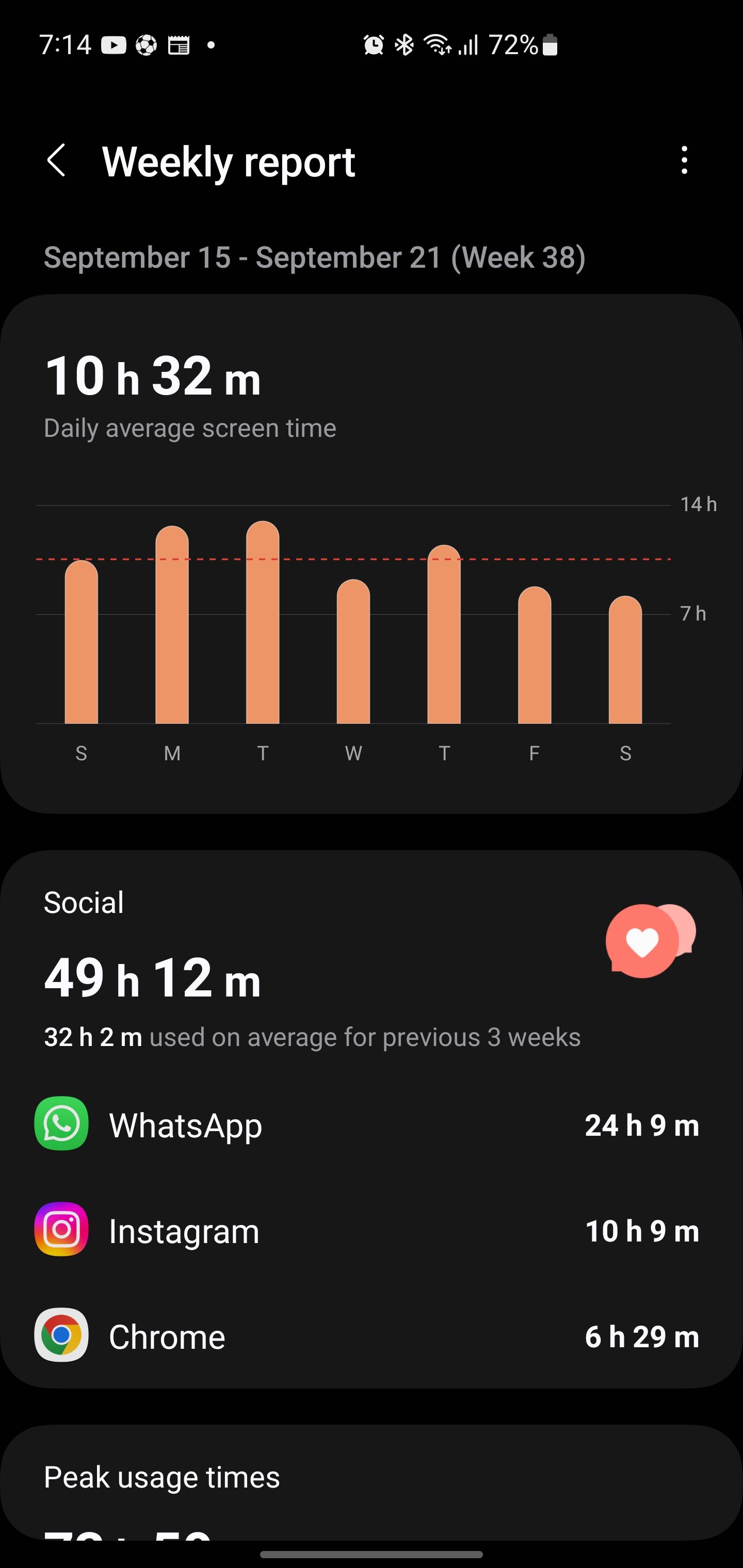Smartphones are practically extensions of our hands—it’s easy to lose track of how much time we actually spend on them. How do you know when it’s more than just a habit and starts veering into addiction territory? Let’s take a look at some signs that might ring a little too true.
1 You Experience Anxiety When Your Phone Is Not Within Reach
Our phones are essential tools these days. They keep us connected to friends, work, the news, and, yes, funny videos. But when you start feeling anxious about not having your phone, that’s different. It’s one thing to feel inconvenienced, but it’s another to feel genuine anxiety—that nagging sense of unease, like you’re missing something important or like you’re out of the loop. Scientists have even given it a name—nomophobia (short for “no mobile phone phobia”), and yes, it’s a real thing, according to the National Institutes of Health (NIH).
So here’s a small test to determine if you are on the “nomophobic” spectrum: the next time you leave the house, try intentionally leaving your phone behind. How does it make you feel? Do you feel some form of distress the longer you spend away from your phone? Or do you immediately feel uneasy when you think about all the messages you’re “missing?”
If that’s the case, and you want to feel more comfortable being phone-free sometimes, start slow. Try leaving your phone at home for short, controlled periods to run errands or take a quick walk. Gradually work on being okay without your phone for longer stretches.
2 Your Screen Time Shows a High Number of Hours
Ever get that weekly screen time report and feel like your phone is low-key judging you? I do. It’s like my phone is saying, “Wow, really? Ten hours a day?” And if you’re nodding along, that might be a sign your phone usage is teetering on the edge of addiction.
Think about it: if your screen time consistently clocks in at five, six, or seven hours (or more), that’s a serious chunk of your day spent glued to a screen. To put that into perspective, if you’re awake for 16 hours, spending 7 hours on your phone means nearly half of your waking life is absorbed by a tiny device. Now, I’m not here to guilt-trip you — because trust me, I’m front-line guilty too (evidenced by the screenshot below) — but it’s worth asking: how many of those hours are actually productive or necessary?

An easy way to get a handle on this situation is by setting screen time limits on certain apps. Even just getting that reminder can snap you out of an Instagram rabbit hole or prevent another “just one more episode” binge on YouTube. You could also try moving some of your regular phone activities — like reading or planning — to your laptop or an actual paper notebook. Analog feels oddly refreshing when you’ve spent hours staring at pixels.
3 You Frequently Check Your Phone, Even When It’s Not Necessary
I’ve caught myself checking my phone at the most random moments: waiting for food at a restaurant, at a stoplight, or even while watching TV. And what do I find? Nothing new—no messages, no notifications, just the same app I closed two minutes ago. It’s not that there’s some urgent task I need to attend to; it’s just the habit of “checking” for the sake of checking.
So, how have I been shaking off this habit? One thing I’ve found helpful is the pause-before-pickup rule. Before grabbing your phone, ask yourself: Do I actually need to check it right now? If the answer is no, resist the urge. Another strategy is to create some friction. Set your phone to require a passcode or extra swipe to unlock rather than letting it instantly open with a thumbprint or face scan. That extra second or two can be enough to make you realize, “Wait, I don’t need to be doing this right now.”
4 Your Smartphone Use Interferes With Your Sleep Hours
The thing with using your phone before bed is that it can easily become a habit you don’t even notice. You open your phone thinking, “I’ll just check a few things,” and then suddenly, an hour (or four!) has disappeared. But it’s not just about the lost time; it’s also about the impact on the quality of your sleep. Over time, a lack of quality sleep can have ripple effects from mood swings to difficulty concentrating and even more serious health problems like anxiety or depression.
So, what can you do about it? Well, the first step is recognizing that bedtime is sacred. Consider setting a “tech curfew” for yourself. That means putting your phone down at least 30 minutes before bed (an hour if you can). I know it sounds difficult—trust me, I’ve fought the urge to check my notifications late at night more times than I’d like to admit—but it makes a huge difference.
If you’re like me and need something to unwind with, try swapping the phone for a book or a podcast instead—something without a screen. You could also try leaving your phone in another room altogether (radical, I know). If you use your phone as your alarm, think about getting an actual alarm clock—yeah, they still exist!
5 You Feel Compelled to Use Your Phone During Social Interactions
If you find yourself pulling out your phone during dinner with friends, at family gatherings, or even while someone (especially your lover) is telling you something important, this might be a sign of phone addiction. It’s a tricky habit because most of us don’t even realize we’re doing it until someone points it out—or gives us that annoyed look (shout out to my girlfriend). We think, “I’m just checking one thing!” But before you know it, five minutes have passed, and you’ve missed half the conversation.
It’s easy to justify, too. “I’m just multitasking,” we tell ourselves, “I can listen and browse at the same time.” But the truth is, you can’t fully engage in the moment if your brain is constantly switching between in-person interaction and digital distractions. Think of it like trying to read a book while also watching TV—you might catch the gist of both, but you’re never fully immersed in either.
Here’s a trick I’ve found helpful: when I’m about to meet up with friends, I switch my phone to “Do Not Disturb” mode or put it on airplane mode. I’ve even gone so far as to leave my phone in my bag, car, or another room just to break that constant urge to check it. It feels awkward at first, but the conversations are way more enjoyable without that tug-of-war for attention.
6 You Use Your Phone While Engaging in Dangerous Activities
Let’s talk about the elephant in the room here: texting and driving. You know it’s dangerous, I know it’s dangerous, yet so many of us still do it. It’s almost as if our brains rationalize it with, “Oh, just a glance—it’s fine.” But here’s the truth: even that quick glance is long enough to miss a pedestrian, run a red light, or swerve into another lane. I mean, you wouldn’t close your eyes for five seconds while driving, right? Yet that’s exactly what happens when you look at your phone. To put it bluntly, no message, meme, or Instagram story is worth your life—or someone else’s.
And it’s not just about driving. Walking while texting is another sneaky one. You might think it’s harmless, but I’ve seen people almost walk into traffic, stumble over curbs, and straight-up crash into other pedestrians because they were too engrossed in their screens. It goes without saying the same for other activities that require your full concentration, such as operating heavy machinery and the like.
So, what can you do about it? Start by making a rule for yourself: no phone while driving. Not even at stoplights. You can achieve this by putting your phone in a bag in the trunk of your car to eliminate any temptation that may arise. And if you’re walking somewhere, keep your phone in your bag or pocket until you’re safely at your destination. Another tip is to enable Do Not Disturb or Focus mode while you’re on the move. It automatically silences notifications, so you’re not distracted by every buzz or beep.
7 You Feel Phantom Vibrations or Hear Imaginary Notifications
Have you ever reached for your phone, convinced you felt it buzz, only to find that it was all in your head? Or maybe you’ve heard that familiar notification sound—except there was no notification. If so, you’re not alone. It could be a case of what is known as Phantom vibration syndrome (You can read more about it on this Wikipedia page). These “phantom” sensations happen when our brains get so used to notifications, vibrations, and the sound of our phone going off that they create false signals—more like hallucinations.
So what can you do if you keep getting faked out by ghost notifications? For one, try turning off non-essential notifications. Do you really need to know every time someone posts a new photo on Instagram or likes a tweet? By minimizing the number of alerts you receive, you’ll begin to reprogram your brain to expect less, which might reduce those phantom feelings.
Another simple fix is to switch your phone to silent (until you think you’ve made progress) and turn off the vibration. If you’re not constantly waiting for a sound, you won’t be as jumpy when there isn’t one.




